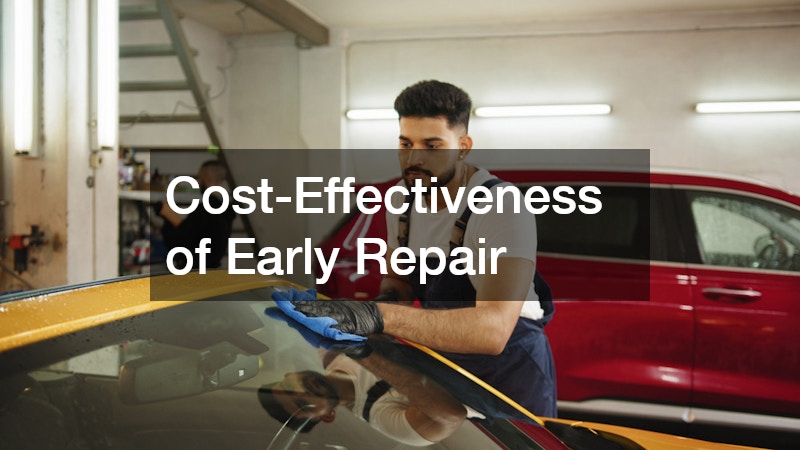Learn why addressing windshield damage promptly can prevent higher costs and avoid unnecessary complications. This article delves into common concerns and offers insights into the benefits of timely repair. By understanding the implications of neglecting windshield issues, drivers can make informed decisions that prioritize safety and financial savings.
Preventing Further Damage
Explore how unattended cracks can expand, leading to more extensive damage that might require a full replacement. Windshield cracks often start small but can rapidly grow due to temperature changes and vehicle vibrations.
Once a crack begins to spread, the likelihood of needing a complete windshield replacement increases significantly, elevating repair costs.
By addressing small windshield chips or cracks early on, the risk of further damage is minimized. Modern technologies in auto glass repair allow technicians to seal small damages efficiently, thus prolonging the life of the windshield. Immediate attention to these problems helps maintain the integrity of the glass, protecting it from external factors that could worsen the situation.
Maintaining Structural Integrity
Understand the role of your windshield in the overall safety of your vehicle and how early repair supports this structure. The windshield is crucial to the structural integrity of a vehicle, accounting for up to 30% of its structural strength. A compromised windshield can fail during a collision, reducing the efficacy of airbags and increasing the risk of passenger ejection.
Early repairs maintain the windshield’s strength, ensuring it provides the necessary support in the event of an accident. Technicians utilize advanced materials to mend cracks, restoring the windshield to its original robust condition. This restoration plays a significant role during rollovers and front-end collisions, where the windshield supports the vehicle’s roof and prevents it from collapsing.
Cost-Effectiveness of Early Repair
Compare the costs between early repairs and replacements caused by prolonged neglect. Windshield repairs are generally more affordable compared to full replacements. The average cost of a windshield repair ranges from $50 to $150, while a complete replacement can soar to $400 or more, depending on the make and model of the vehicle.
Insurance companies often cover these minor repairs with little to no out-of-pocket cost to the policyholder. Taking advantage of such coverage for small repairs can prevent the need for costlier replacements down the line. Being proactive with repairs protects against rising auto repair expenses, helping car owners maintain their budgets.
Checking Credentials and Certifications
Why it’s crucial to select a repair shop with certified technicians for quality assurance. Certified technicians demonstrate mastery in their trade, ensuring high standards of repair execution. The National Glass Association (NGA) and the Independent Glass Association (IGA) are reputable organizations that certify skilled professionals.
When technicians are certified, they are well-versed in the latest repair technologies and techniques, which guarantees the quality of the repair service provided. Certified shops often adhere to safety and regulatory standards, offering peace of mind that repairs are done correctly. This certification becomes a vital factor in choosing a reliable service provider for such critical repairs.
Comparing Costs and Services
Learn strategies for evaluating service prices to ensure you receive value for money without compromising quality. It’s essential to obtain quotes from multiple repair shops to assess the average market rate for the required service. Comparing prices helps ensure you’re not overcharged while also highlighting overly cheap services that might compromise quality.
Alongside cost, the range of services provided should be considered. Some shops offer mobile repair services, making it convenient for car owners unable to visit the location. Additionally, warranties on repairs can be a differentiating factor, offering future protection if the initial repair fails.
Understanding Your Policy
How to decipher your insurance policy’s coverage terms regarding windshield repair or replacement. Certain policies include comprehensive coverage that extends to glass repair without affecting premiums. It is crucial to read through the fine print or consult with your insurance provider to understand the specific terms related to windshield repairs.
Some policies offer full coverage for repairs while others may charge a deductible for replacements. Knowing these details in advance ensures you maximize the benefits of your insurance policy. Early clarification prevents disputes or additional out-of-pocket costs when filing a claim.
Making a Claim
Step-by-step guidance on how to file a claim for windshield repair effectively. Initiating the claim process generally begins with contacting your insurance company as soon as damage occurs. This promptness ensures all requirements are met and any time-sensitive conditions, like repair timelines, are adhered to.
Provide detailed information, such as the extent of the damage and circumstances surrounding it, for the claim to be processed efficiently. Most insurers have preferred repair networks, streamlining the process while ensuring high-quality repairs. Following the insurer’s guidance helps avoid common pitfalls, ensuring swift and effective claim fulfillment.
Benefits of Insurance-covered Repairs
Explore the advantages of utilizing insurance for windshield repairs, including potential cost savings. Utilizing insurance for repairs minimizes or eliminates out-of-pocket expenses that would otherwise strain personal finances. Insurers encourage using coverage for minor repairs to maintain the vehicle’s integrity and reduce the risk of larger claims.
Timely windshield repair is a small step that offers significant benefits. From safety enhancements to financial savings, addressing windshield damage promptly avoids complications and ensures peace of mind on the road. By proactively managing windshield health, vehicle owners safeguard themselves and their passengers while preserving their vehicle investment.

